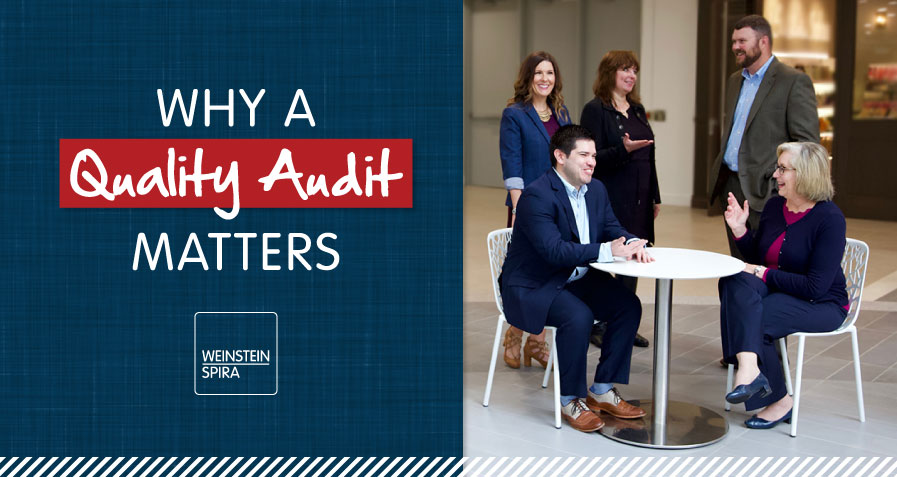These days, financial statements are under more scrutiny and subject to stricter regulations to meet high quality standards in the U.S. and around the world. Whether you are a private company needing to comply with your bank’s credit agreement, or a publicly held company wanting to maintain investor confidence, the accuracy and, thus, the quality of reported numbers is essential.
Let’s first define a high-quality audit: A systematic and objective assessment of your business’s accounts, performed by a qualified, independent organization in compliance with current auditing standards. The goal is to ensure your financial statements give a true and fair view of your accounts, business, and current circumstances.
On the flip side, poor-quality audits can have serious repercussions. Although it may seem like a low-priority, “box-checking” exercise for private companies with little to no effect on daily operations, poor quality audits may come back to bite you later. For example, when it is time to sell your company, it is critical to have the right valuation figures, based on past audits, or that transaction could be jeopardized. And in the case of public companies, the last thing you want is to have to restate your numbers if a material error is made, potentially impacting shareholder value and raising a red flag for what else may have been inaccurately reported.
Finding a Quality Auditing Firm
It all starts with selecting a quality audit firm that can provide the team right for you. To find the best match for your needs takes an inquiring mind, doing some research, and asking tough questions. Here are some recommendations to help ensure you get the quality results you deserve.
-
Select a quality audit firm
You may pay a bit more to retain a well-established firm to perform your audit, but it will be worth it in the long run! Of course, everyone wants a “reasonable” bid without sacrificing quality. But, beware of the low bidders, who want to get a foot in the door and end up increasing their fees down the road. Relying on referrals is a good way to find a firm that has the proven reputation for delivering what they promise. You can also evaluate them by their website content, which often includes testimonials along with credentials and firm history, and can provide valuable insight into who you would be dealing with.
-
Ensure the audit team is experienced in your industry
Depending on the industry, companies can have unique accounting details specific to the business space they operate in. To avoid missing or overlooking something, go ahead and ask if an accounting firm (and their audit department, in particular) is knowledgeable about your type of business and has had direct experience with other clients in the same industry as you. This expertise goes a long way in preventing “gotcha” moments and reworking the numbers. It is also a good idea to ask how long an individual has worked at the firm, on the audit team, and if the team has worked together on multiple engagements.
-
Expect continuity and communication
It is hard for auditors to learn all there is to know about your operations in one year. Therefore, it is preferable to have a consistent audit team assigned to your company, so they get to know you and your business over time. It is also not enough to just meet annually during the audit; rather, it takes continuous, open lines of communication to stay in touch about what happens in the course of a year, as much can change in 12 months. An accounting firm that switches the team lead or members on the team from year to year, or will not even take your call once the audit ends, is one to steer away from.
-
Keep assessing audit quality
Assessing audit quality is an ever-evolving practice; as your company and the business environment evolve, so do your audit objectives. So, this is not a one-time, static occurrence. It is wise to monitor the quality of audits as circumstances change to keep your needs aligned with the audit firm’s capabilities.
In Conclusion
When an audit is complete, the financial statement, itself, will look basically the same…no matter who prepares it. But it is the quality, getting it right the first time, that matters most. The other key considerations are your experience of how the overall audit went and the relationship you were able to build with your auditors. Working with quality accounting and auditing professionals makes a big difference.
As a boutique mid-market accounting firm, Weinstein Spira caters to each of our clients’ audit needs, making the process as painless as possible. We focus on developing relationships through ongoing consulting—not merely accounting transactions.
Have more questions about your upcoming audit? Give us a call to discuss your audit concerns.



